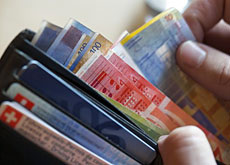Inflation takes off strongly in October

Switzerland's annual inflation rate has jumped to 1.3 per cent – its highest level in 15 months – following an unexpectedly sharp increase in October.
Inflation rose 0.9 per cent compared with September, driven by a rise in prices for clothes and shoes, figures from the Federal Statistics Office showed on Friday.
The Statistics Office said in a statement that it expected annual inflation, which was 0.7 per cent in September, to average out at 0.7 per cent this year, rising to about 1.5 per cent in 2008.
The increase in prices for October was mainly due to a 19.2 per cent increase in the clothes and shoes reference group, it said.
Looking ahead to December, it said it expected inflation to be running at between 1.5 and two per cent compared with a year ago.
But it said that its forecast figures could be upset by the high fluctuation of prices for petroleum products.
Surprised
“We are surprised to see that the CPI [consumer price index] jumped up so sharply. Although we had anticipated the sharp jump in prices for clothes and footwear, we didn’t expect such a sharp impact on the headline figure,” said Katrina Attard at market analyst company 4CAST.
She said the sharp increase was in line with recent comments by members of the Swiss National Bank (SNB) clearly saying there were significant risks to inflation.
“There is definitely concern from the Bank, and given that oil and food prices are set to rise further, the Bank is going to be cautious to say the least,” Attard added.
Fabian Heller at Credit Suisse said Switzerland’s second-largest bank had expected the inflation figures.
“It’s interesting that inflation for imported products has risen strongly and is even above the inflation for domestically predicted products. Much of this is due to the high oil prices though.”
Heller said CS saw more signs that the weak franc was adding to imported inflation and was sticking to its forecast of an interest rate rise by the SNB in December “though there is a risk they will wait”.
Weak franc
Speaking in Geneva on Thursday, a vice-president of the SNB, Thomas Jordan, confirmed the Swiss economy and inflation rate were developing as expected but the weak franc posed a particular risk.
He noted that the overall outlook was uncertain due to the global credit crisis.
“Against the backdrop of a robust economy, subdued inflation and a healthy economic structure, the situation for the National Bank is good. This allows [the SNB] to take a balanced approach in determining future monetary policy.”
But he added: “The National Bank would not hesitate to act with monetary policy should the development of the Swiss franc endanger price stability.”
Inflation in Switzerland has remained well below the SNB’s threshold for price stability of two per cent.
swissinfo with agencies
The KOF Swiss Economic Institute – part of the Federal Institute of Technology in Zurich – warned the Swiss National Bank on Friday against raising interest rates only to counter the weakness of the Swiss franc.
It said the central bank was still supplying the Swiss interbanking market with cheap liquidity as business between banks was still sluggish.
“A more restrictive monetary policy is rather inappropriate given the still tense situation in interbanking markets,” the institute said in the KOF bulletin.
“Interest rate moves driven by currency policy considerations could possibly undermine the stability of the Swiss financial market,” it added.
The KOF institute said that despite the Swiss franc hitting a new low against the euro in October, in terms of the trade-weighted index, which measures the franc’s value against all Switzerland’s key export currencies, its drop in value had been “only modest”.
It said that in its view, current currency developments were not jeopardising price stability.
And it noted that while the euro now costs about 15 per cent more than it did in mid-2002, the Swiss franc also posted similar gains against the United States dollar and the Japanese yen.

In compliance with the JTI standards
More: SWI swissinfo.ch certified by the Journalism Trust Initiative



You can find an overview of ongoing debates with our journalists here. Please join us!
If you want to start a conversation about a topic raised in this article or want to report factual errors, email us at english@swissinfo.ch.